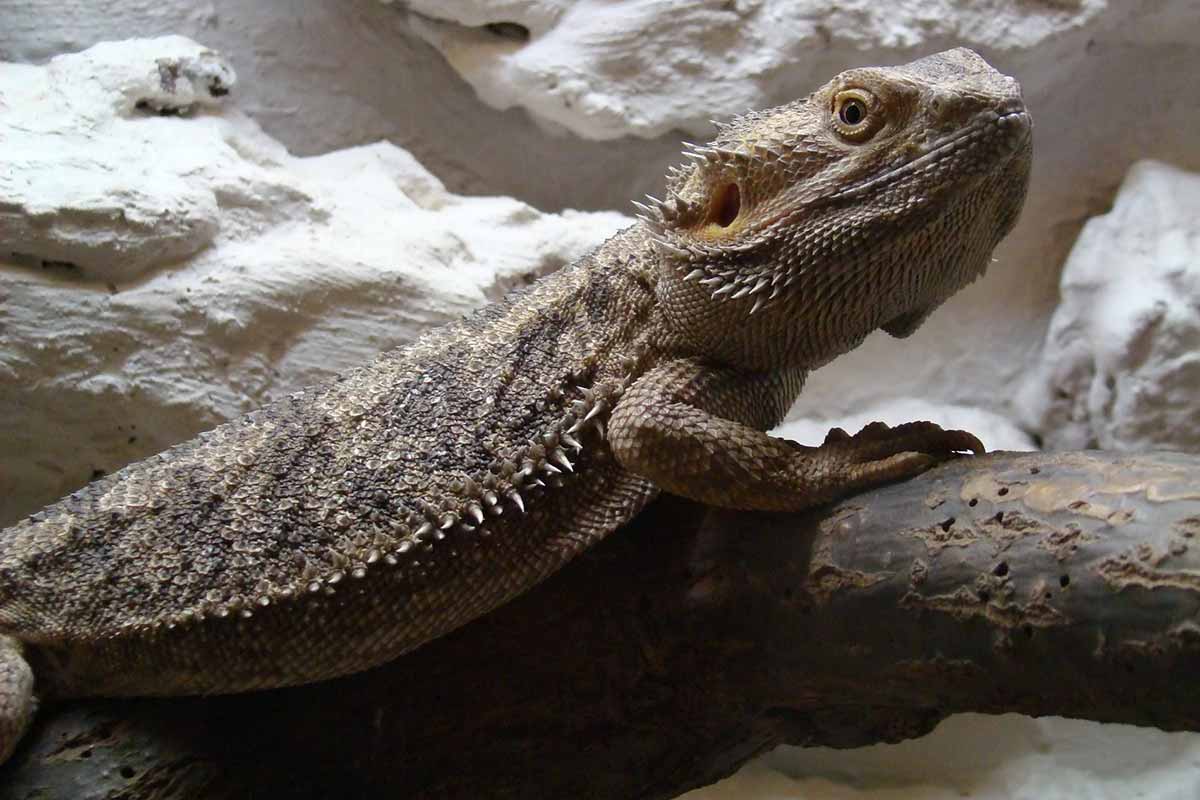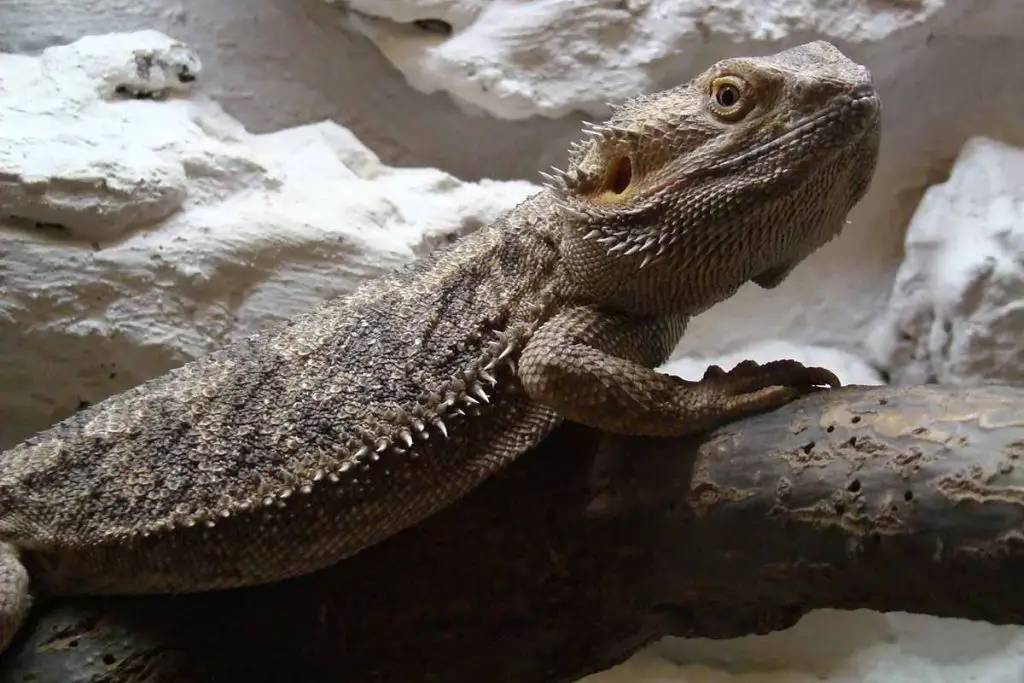Are you concerned that your bearded dragon is not growing as it should? This is a common question among pet owners who own these fascinating creatures. As owners, we want to make sure our pets are happy and healthy, and growth is a crucial factor in determining their well-being. In this article, we will explore the reasons why your bearded dragon may not be growing and what you can do to help them reach their full potential.
There could be several reasons why your bearded dragon is not growing. One of the most common reasons is improper diet and nutrition. Bearded dragons require a specific balance of protein, vegetables, and fruits in their diet to grow properly. Other reasons could be inadequate lighting or improper temperature in their habitat. Make sure to provide your bearded dragon with a balanced diet and a suitable habitat to promote healthy growth.

Why is My Bearded Dragon Not Growing?
If you own a bearded dragon, you know how important their growth is to their overall health and well-being. However, there may come a time when you notice that your bearded dragon is not growing as it should be. This can be concerning, but there are a few reasons why this might be happening. In this article, we will explore some common reasons why your bearded dragon may not be growing and what you can do to help.
Poor Nutrition
The first and most common reason why your bearded dragon may not be growing is poor nutrition. Bearded dragons require a balanced diet that is rich in vitamins and minerals to ensure their growth and development. If your bearded dragon is not getting the proper nutrition, it can lead to stunted growth or even malnutrition.
To ensure your bearded dragon is getting the proper nutrition, you should feed them a diet that consists of a variety of live insects such as crickets, mealworms, and roaches. You can also offer them fresh fruits and vegetables such as kale, carrots, and blueberries. Be sure to also provide your bearded dragon with a calcium supplement to help with bone growth.
Inadequate Lighting
Another reason why your bearded dragon may not be growing is due to inadequate lighting. Bearded dragons require access to UVB lighting to help them produce vitamin D3, which is necessary for proper calcium absorption. Without UVB lighting, your bearded dragon may develop metabolic bone disease, which can cause stunted growth and other health issues.
To ensure your bearded dragon is getting adequate lighting, you should provide them with a UVB bulb that is specifically designed for reptiles. The bulb should be placed in a fixture that is positioned over the basking area of the tank. You should also ensure that the bulb is replaced every 6-12 months to ensure it is providing the proper amount of UVB.
Incorrect Temperature
Bearded dragons require a specific temperature range in order to digest their food properly and maintain their overall health. If the temperature in their environment is too low or too high, it can affect their growth and development.
To ensure your bearded dragon is getting the proper temperature range, you should provide them with a basking area that is between 100-110°F and a cooler area that is between 75-85°F. You can use a heat lamp or ceramic heat emitter to provide heat to the tank. You should also use a thermometer to monitor the temperature and make adjustments as needed.
Stress
Stress can also be a factor in why your bearded dragon is not growing. Bearded dragons are sensitive animals and can become stressed easily if their environment is not suitable or if they are not handled properly. Stress can lead to a decrease in appetite and a lack of growth.
To reduce stress in your bearded dragon, you should ensure they have a suitable environment that includes plenty of hiding spots, a basking area, and proper lighting and temperature. You should also avoid handling them too much or too roughly, as this can cause stress.
Illness
Finally, illness can also be a reason why your bearded dragon is not growing. Illnesses such as parasites, respiratory infections, and metabolic bone disease can all affect a bearded dragon’s growth and development.
If you suspect your bearded dragon is ill, you should take them to a veterinarian who specializes in reptiles. The veterinarian can perform a thorough examination and provide treatment if necessary.
The Benefits of a Healthy Bearded Dragon
Ensuring your bearded dragon is growing properly is important for their overall health and well-being. A healthy bearded dragon will have a long lifespan, be more active, and have a better quality of life.
The Difference Between a Healthy and Unhealthy Bearded Dragon
A healthy bearded dragon will have bright and alert eyes, clear skin, and a healthy appetite. They will also be active and alert, and have a good body weight. An unhealthy bearded dragon, on the other hand, may have sunken eyes, dull or discolored skin, and a lack of appetite. They may also be lethargic and have a low body weight.
Conclusion
In conclusion, there are several reasons why your bearded dragon may not be growing as it should be. Poor nutrition, inadequate lighting, incorrect temperature, stress, and illness can all affect a bearded dragon’s growth and development. By ensuring your bearded dragon has a suitable environment, a balanced diet, and proper lighting and temperature, you can help them grow and thrive. If you suspect your bearded dragon is ill, it is important to seek veterinary care as soon as possible.
Frequently Asked Questions
Bearded dragons are fascinating creatures to keep as pets. However, as a pet owner, you might get concerned if your bearded dragon is not growing as it should. Here are some frequently asked questions about why your bearded dragon is not growing.
Why is my bearded dragon not growing?
There can be several reasons why your bearded dragon is not growing. One of the most common reasons is inadequate nutrition. If your bearded dragon is not getting enough of a balanced diet, it will not grow at the expected rate. Another reason could be an issue with the enclosure. If the enclosure is too small, the bearded dragon will not be able to grow to its full potential. Additionally, issues with temperature and lighting can also cause stunted growth.
If you suspect that your bearded dragon is not growing due to nutrition or enclosure issues, consult with an experienced reptile veterinarian. They can help you identify the root cause of the issue and develop a plan to help your bearded dragon grow to its full potential.
How can I ensure my bearded dragon gets adequate nutrition?
Bearded dragons require a balanced diet that includes a variety of vegetables, fruits, and insects. You can offer your bearded dragon a mix of dark leafy greens, carrots, squash, and fruits like berries and melons. Insects like crickets, mealworms, and dubia roaches are also an excellent source of protein for your bearded dragon.
It is crucial to ensure that you are providing the right balance of nutrients and that the insects are gut-loaded and dusted with the appropriate supplements. You can consult with an experienced reptile veterinarian or a reptile nutrition expert to develop a balanced diet plan for your bearded dragon.
What size enclosure do bearded dragons need?
Bearded dragons require an enclosure that is large enough to accommodate their growth and activity levels. For a single bearded dragon, the enclosure should be at least 40 gallons. However, it is recommended to provide an enclosure that is 75-120 gallons. The enclosure should be equipped with appropriate lighting and heating to ensure that your bearded dragon is comfortable and healthy.
Additionally, you should provide various natural decorations like rocks, logs, and plants for your bearded dragon to explore and climb. This will help to provide a stimulating and enriching environment for your bearded dragon.
What should be the temperature and lighting in the enclosure?
Bearded dragons require a basking spot with a temperature of 100-105°F and a cooler side with a temperature of 75-85°F. The enclosure should also have a UVB light that provides 10-12 hours of exposure per day. The UVB light helps to synthesize vitamin D3, which is essential for calcium absorption and overall health.
It is crucial to monitor the temperature and lighting in the enclosure regularly. You can use a thermometer and a hygrometer to ensure that the temperature and humidity levels are appropriate for your bearded dragon.
What are some other reasons why my bearded dragon is not growing?
Other reasons why your bearded dragon might not be growing could include genetics, illness, or parasites. Some bearded dragons may have a slower growth rate due to their genetics. Illness or parasites can also affect the growth rate of your bearded dragon. If you suspect that your bearded dragon is not growing due to illness or parasites, consult with an experienced reptile veterinarian immediately.
It is essential to provide regular veterinary check-ups and monitor your bearded dragon’s growth rate to ensure that it is healthy and growing at the expected rate.
What makes Bearded Dragons Grow Fast
In conclusion, there could be several reasons why your bearded dragon is not growing. It’s important to ensure that they are receiving the proper nutrition, including a balanced diet of insects and vegetables. Another factor to consider is the temperature and lighting in their enclosure, as bearded dragons require specific conditions to thrive. Additionally, genetics could also play a role in their growth rate, so it’s important to research the breed and understand their expected size. By taking these factors into consideration and providing the appropriate care, you can help your bearded dragon reach their full potential and enjoy a long and healthy life.


